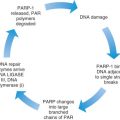Cervical Cancer
Cervical cancer screening should begin at age 21 years. Cytologic screening is recommended every 2 years for women ages 21 to 29 years with either conventional or liquid-based cytology. Women ages 30 years and older who have had three consecutive cervical cytology test results that are negative for intraepithelial lesions and malignancy may be screened every 3 years. Women with any of the following risk factors may require more frequent cervical cytology:
- 1.
Women who are immunosuppressed
- 2.
Women who are infected with human immunodeficiency virus (HIV)
- 3.
Women who were exposed to diethylstilbestrol in utero
- 4.
Women who were previously treated for cervical intraepithelial neoplasia (CIN) 2 or 3 or cancer
Co-testing using the combination of cytology plus HPV DNA testing is appropriate screening for women older than 30 years. Co-testing in women younger than 30 years is not recommended.
In women who have had a total hysterectomy for benign indications with no history of high-grade CIN, routine cytology testing should be discontinued.
It is reasonable to discontinue cervical cancer screening between 65 and 70 years of age in women who have had three or more negative cytology test results in a row and no abnormal test results in the past 10 years.
Women who have been immunized against HPV-16 and HPV-18 should be screened by the same regimen as nonimmunized women.
Breast Cancer
Mammography should be performed every year for women 40 years of age and older.
Evidence from several studies indicates that there is a decrease in mortality for all women when appropriate screening by mammography is instituted and performed by qualified personnel. The efficacy of mammography is not in doubt. The question that remains is the optimal screening frequency, and the answer may be provided by data now being compiled. Safety is no longer a concern, but it is recognized that mammography is the most costly of all screening modalities. Dedicated equipment is essential, and considerable skill and experience are required to interpret the films. It is important, therefore, to determine the most prudent utilization of resources. Until the optimal screening frequency is determined, it appears reasonable to follow recommendations of the American College of Obstetricians and Gynecologists, American Cancer Society, and National Cancer Institute.
Stay updated, free articles. Join our Telegram channel

Full access? Get Clinical Tree








